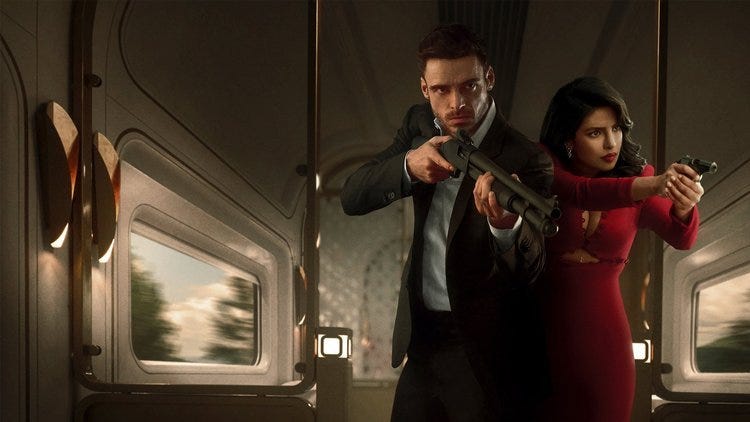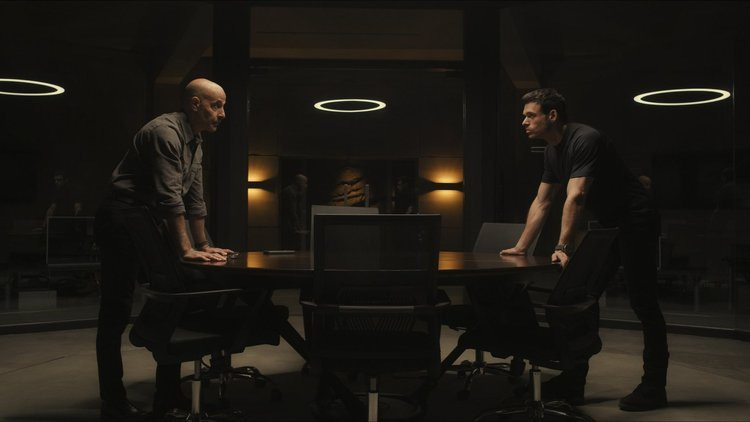‘Citadel’ Review: Prime Video’s New Show Attempts to Extend the Spy Genre Experience to Global Audiences
So how do spy thrillers adapt with modern audiences? Well, the answer certainly isn’t Joe and Anthony Russo if Citadel is any indication. And the real kicker? I kind of dig it…
The global spy agency Citadel has fallen and the memory of its agents has been erased. Now, the powerful Manticore crime syndicate is filling the power vacuum. Citadel agents must remember their past and find the strength to fight back.
We live in a world…with an abundance of good spy stories (and maybe not enough?). From spine-tingling novelizations to bone-crushing motion pictures and television fictionalizations. Over the years, several impressive titles come to mind in the field of spy-thrillers: Mission Impossible, Burn Notice, Remington Steel, Alex Rider, Jack Ryan, and the infamous James Bond franchise. Some would argue that these stories should be decommissioned due to their staple tropes but, on the contrary, we’ve seen plenty of genres be revitalized by creatives with a different approach. Perhaps, no genre better reflects the resurgence of original storytelling better than horror.
And while there has been plenty of room for a much needed expansion of the spy sub-genre, there hasn’t been a big enough thrust into exploring the appetite for change. How does the industry grapple with a thirst for originality? It truly has to start in the writer’s room with a basic foundation of story. The approach in conceptualizing that basic principle of storytelling is where creativity can flourish with new ideas and themes. Creators don’t necessarily need to scrap every trope that came before [except the awful, inherent sexism plaguing the action genre — Pussy Galore comes to mind]. Audiences have continuously shown that they welcome these common familiarities.
With the success of shows like House of the Dragon and even Cary Joji Fukunaga’s No Time to Die, we are beginning to understand that it’s not necessarily new franchises that “save” genre storytelling (though it can be true), it’s fresh eyes on the material. Of course, there will always be room for the spectacle of the action set-piece — experiences tediously executed in media such as in Mission Impossible, but there can be much more excess in tales of espionage. So how do spy thrillers adapt with modern audiences? Well, the answer certainly isn’t Joe and Anthony Russo if Citadel is any indication. And the real kicker? I kind of dig Citadel, at least the first three episodes I’ve seen. And if nothing else, the show is a whole lot of fun.
Just like most good spy stories, the audience follows an organization called Citadel, which operates in the shadows of all international government agencies. And yes, Citadel has an equally evil counterpart in Manticore. The rivalry is about as silly and melodramatic as you can imagine. Manticore wants to unleash hell on Earth and Citadel is tasked with thwarting their every effort. Taking the lead in Citadel’s operation are Mason Kane (Richard Madden), Nadia Sinh (Priyanka Chopra Jonas), and Bernard Orlick (Stanley Tucci). The chemistry between the three main Citadel agents is rather thin, but the performances do compensate for the relatively uninspired writing — particularly Jonas, who outright steals every scene. Madden is also great, playing a stoic (and very forgetful) secret agent.
Lesley Manville makes for a brutal, cut-throat antagonist and there’s plenty of entertaining banter between her character and Tucci’s Orlick. Citadel feels authentic to itself with dialogue heavy scenes in favor of incessant nail-biting action. Humor makes for a large focus in the overall tone without completely straying into parody territory. Though, it does feel more like modern superhero humor than something more distinctive — say Burn Notice. Oddly enough, it reminds me of the hefty conspiracy plots and slapstick nature of Call of Duty: Black Ops (2010) more than anything. Contingencies embedded in the Citadel spy organization pave way for some shocking revelations and interesting personal dilemmas for the characters (particularly the memory loss angle the show leads with) when Citadel inevitably implodes.
It does take the international element of the sub-genre very seriously as it was filmed partially in Miami, London, Morocco, and even Spain. The constant time-jumps and story dicing feel jarring at times, but it helps inform the authenticity of a global spy network — even while the plot can feel heavily contrived due to the grand scope of the series focusing on said international spy syndicates. Here’s to hoping we get less flashbacks and more Stanley Tucci and Lesley Manville madness! But seriously, from what I’ve seen there is plenty of opportunity for the show to capitalize on a different style the genre hasn’t explored yet on camera. And with a potential second season in the works, it’s possible the world building will subside for character-driven arcs where Citadel’s central tone can really take a more unique identity that’s been teased thus far.
However, on a projected $300 million budget, one of the largest budgets in a television production, the action sequences do not feel particularly impactful or memorable. It leaves much to be desired in terms of these critical, destructive moments that flood the action genre. Though, the cinematography unexpectedly shines with a distinctive flavor that evokes the visual landscape of an espionage thriller. Particularly, the way in which the cinematographers capture the frame as it twirls, quite literally, to reveal yet another twist in the story. It’s both clever and insanely meta (not to mention, just plain cool). Citadel doesn’t exactly know what kind of show it wants to be but it isn’t afraid to reach for new ideas, either. Beyond the actual series, the most interesting piece of the entire property lies within the production itself.
Amazon is pressing into creating a larger market for both theatrical distribution and international IP. Citadel released theatrically for Amazon Prime members around the country before the show’s official premiere. What’s more, the Citadel-verse is expanding into international television markets: the first announced spin-off is being produced in Italy, which began filming in October of last year. Additionally, there is an untitled Indian project directed by acclaimed duo Raj Nidimoru and Krishna DK (known as Raj & DK) in the works. It’ll be interesting to see the reach this franchise has across international borders. I certainly feel this will bolster the worldwide attention on the show and am excited to see how Citadel wraps the first season. I’m also eagerly anticipating how the show can lead into more culturally diverse territory through their distribution strategy.
Overall, it makes for an easy watch over the weekend. Though the series falters with some originality, its tone feels both reminiscent and pointed. We will see if Citadel can hack viewer’s attention soon enough.
The first two episodes of Citadel release on Amazon Prime Video on April 28th and weekly thereafter for a total of six episodes. Citadel is executive produced by The Russo Brothers, with David Weil serving as the primary showrunner.



